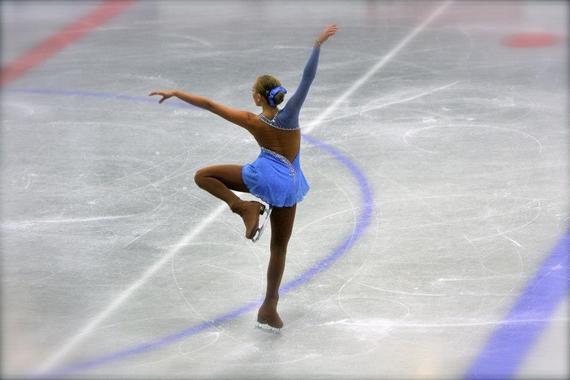
From watching the battle, to being a part of it.
Cancer.
A black hole. A time bomb. A nightmare.
Some of us can begin to comprehend the meaning of cancer: its internal destructiveness that infuses into every component of daily life, its ability to stop time yet accelerate it, its surrealness. For many cancer is simply a story: a friend of a friend, a headline, a book. In reality, cancer is a life. It is every second of every day. This segregation of thought limits our ability to cope with the devastating disease. We often create separations of the ill and the well, the unhealthy and the healthy, the young and the old. As a result, those who rarely suffer don't walk into the realm of suffering, because it's too heartbreaking a place. But the truth is we all have a part to play in the battle - not just those who have the diagnosis.
In grade 12 (2013), a very close friend of mine, Carley, walked into class after skating practice. She was a competitive figure skater with aspirations to compete at the Olympics, a passionate singer and songwriter (who also got the attention of Selena Gomez and other celebrities alike), and an academic who excelled in school. I always admired her drive, in addition to her smiley presence that made all of us in awe of how passion, hard work, and happiness can synergize. I was sitting next to Carley that day in class, and could distinctly hear her breathing; it was very loud, very deep. Carley told me multiple doctors said it was asthma and her skating coaches thought her level of fitness was not up to par. I didn't think much of it.
A few weeks went by and I noticed a some changes. Carley was losing weight, didn't have much of an appetite, and seemed unwell. I believed it was the stress of exams, or maybe just a phase. Carley would be fine with rest, or so I thought.
One morning Carley sent me a text from the hospital explaining doctors found a small hole in her lung. A few days later she told me, "they found a tumor against my trachea," and it hadn't occurred to me this meant cancer. She didn't have the words to say it, and perhaps my wishful thinking didn't provide her with the opportunity to.
My friend was diagnosed with a rare 1 in 3.5 billion type of clear cell sarcoma. Carley's life flipped upside down. Chemotherapy, hospital visits, radiation, blood work, the side of effects of aggressive medications, fertility decisions, and surgery all took over. Carley went from searching prom dresses to treatments that could cure her. Instead of planning for grad trips and senior events, she was travelling for treatments and creating events to support others with cancer. The gravity of what Carley was dealing with can hardly be put into words. It pains me to think the largest personal problem I had at the time was probably "senioritis."
After understanding her diagnosis, I tried to be the best friend I could be: check in frequently, make her little gifts, and be available whenever she needed someone to talk to. I always wanted to do more, but I wasn't sure how. I wanted to respect her privacy, but be an outlet for her. I wanted to be involved, but not impose. I wanted to be supportive, but not sympathetic. I watched as she went through endless rounds of treatment, shared her story with the world, and witnessed how she blossomed into an inspiration. She inspired me to inspire her, to push her, to be there for her. I just never knew what the right answer was, and if there wasn't a right one, was there a wrong one?
We live in a society by which notions of individualism trump collective effort. As a result, we often neglect the power of unity. Perhaps this is attributable to our lack of understanding or awareness. Cancer is the field of medicine in which a plethora of unanswered questions lie; there's no cure. We rarely think of the social, mental, and physical implications of the disease and the impact on those is unfortunately affects. Thus being aware is of the utmost importance as it allows people to use their unique healing powers of love and altruism. It is these actions and values that go beyond the workings of any drug.
Sadly Carley passed away and left a legacy of a true fighter. She fought a battle of life and death, and did so with a courageous prowess and inspirational compassion. I wish I were more informed during her journey so I could have better understood what she went through. Looking back, I don't think it was ever a matter of right or wrong. It was about being there for her in any way she needed - not as a cancer patient, but as a friend, a woman, a skater, a singer, a daughter. We're constantly taught to look at both sides of the story, or see things from the other person's perspective. But with cancer unless you're fighting it, that's nearly impossible. And so, I realized: one cannot possibly understand the inner workings of the disease, but we can comprehend the warriors that battle.
I often hear people saying "he has cancer," or "my friend passed away from cancer." Maybe we shouldn't give the disease an identity. Carley had cancer, sure, but she had so much more. She had an incomparable vivacity and attitude. My extraordinary friend had a disease that made her one in a billion, but to me, it wasn't her disease that made her unique.
To learn more about my friend, Carley Elle Allison, and her journey, click here: http://www.teamcarley.ca

